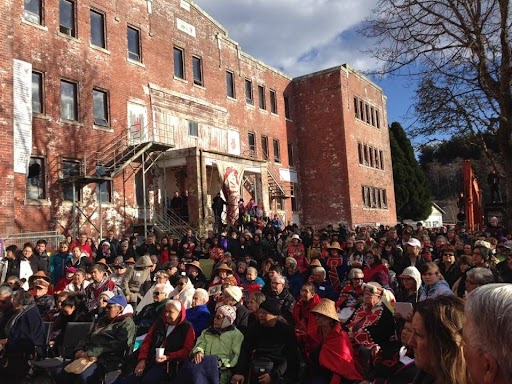
- Details
- By Native News Online Staff
The Canadian government has agreed to pay more than $2 billion to hundreds of Indigenous communities to settle a lawsuit centered around nearly a century of abuse suffered by children who attended Indian residential schools.
The lawsuit, filed by 325 First Nations communities in 2012, sought compensation for the physical, sexual and mental abuse suffered by Indigenous children during the residential school era in Canada.
 Make A Donation Here
Make A Donation Here
From the late 1800s to the 1990s, more than 150,000 First Nations children were forcibly removed from their homes, sent to boarding schools and cut off from their families and culture as part of a government effort to assimilate them into Canadian society. Many of the children were beaten, raped and sexually abused, and thousands are believed to have died from disease and malnutrition.
"The residential school system decimated our languages, profoundly damaged our cultures, and left a legacy of social harms,” Shane Gottfriedson, Representative Plaintiff and former Chief of Tk’emlúps te Secwépemc and a plaintiff in the lawsuit, said in a statement. “The effects go beyond my generation. It will take many generations for us to heal.”
Over the past two years, more than a thousand unmarked graves and possible gravesites have been found on the properties of former residential schools throughout Canada — some as recently as last week.
“It has taken Canada far too long to own up to its history, own up to the genocide it committed and recognize the collective harm caused to our Nations by Residential Schools,” Garry Feschuk, the former chief of the shíshálh and one of the plaintiffs said in a statement. “It is time that Canada not only recognize this harm, but help undo it by walking with us. This settlement is a good first step.”
The settlement, announced on Saturday, calls for Canada to pay $2.1 billion (U.S.) to a not-for-profit trust that is independent of the government. The funds in the trust will be used to support "healing, wellness, education, heritage, language and commemoration activities" for Indigenous people in Canada. The settlement must be approved by the courts.
“We believe that all Survivors deserve justice and the compensation to which they are owed,” Marc Miller, minister of crown-Indigenous relations said in a statement. “As we finalize this settlement, we are reminded of the importance of collaborative dialogue and partnership in resolving historic grievances outside of the court system. Together, we have developed a settlement that will support the Band class members in their healing journeys for generations to come.”
More Stories Like This
Northern Cheyenne Push Back Against Trump Administration’s Effort to Alter Little Bighorn HistoryFlorida Man Sentenced for Falsely Selling Imported Jewelry as Pueblo Indian–Made
Navajo Nation Declares State Of Emergency As Winter Storm Threatens Region
The Prediction Market Boom is Posing an Existential Threat to American Indian Gaming
NARF Condemns ICE Actions, Says Native Americans Unlawfully Detained
Help us defend tribal sovereignty.
At Native News Online, our mission is rooted in telling the stories that strengthen sovereignty and uplift Indigenous voices — not just at year’s end, but every single day.
Because of your generosity last year, we were able to keep our reporters on the ground in tribal communities, at national gatherings and in the halls of Congress — covering the issues that matter most to Indian Country: sovereignty, culture, education, health and economic opportunity.
That support sustained us through a tough year in 2025. Now, as we look to the year ahead, we need your help right now to ensure warrior journalism remains strong — reporting that defends tribal sovereignty, amplifies Native truth, and holds power accountable.
 The stakes couldn't be higher. Your support keeps Native voices heard, Native stories told and Native sovereignty defended.
The stakes couldn't be higher. Your support keeps Native voices heard, Native stories told and Native sovereignty defended.
Stand with Warrior Journalism today.
Levi Rickert (Potawatomi), Editor & Publisher


